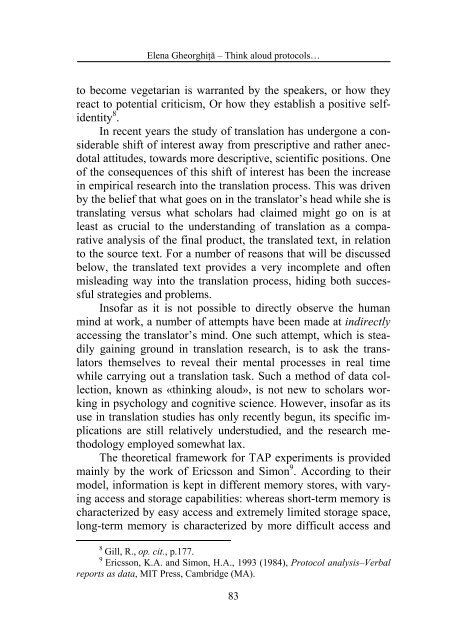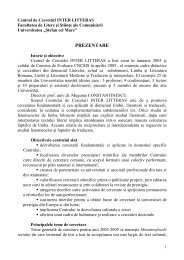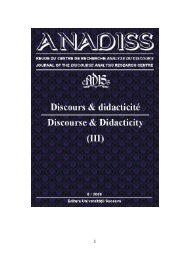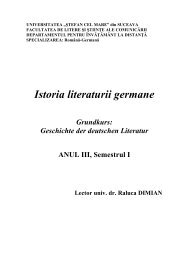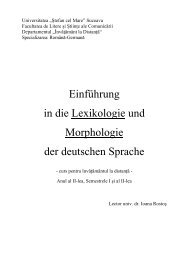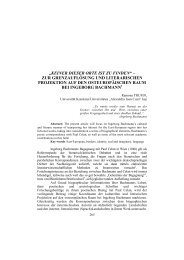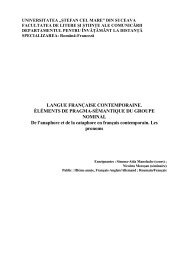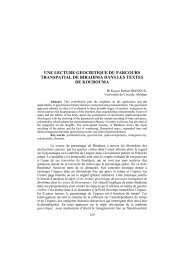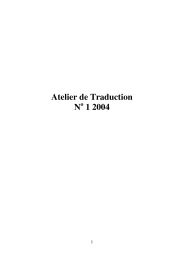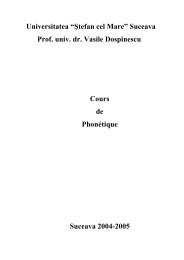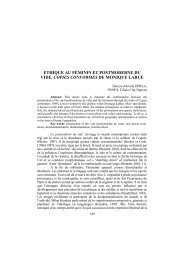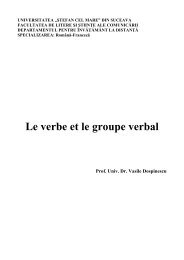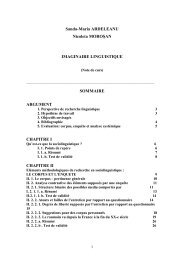Le discours de la francophonie
Le discours de la francophonie
Le discours de la francophonie
Create successful ePaper yourself
Turn your PDF publications into a flip-book with our unique Google optimized e-Paper software.
Elena Gheorghiţă – Think aloud protocols…to become vegetarian is warranted by the speakers, or how theyreact to potential criticism, Or how they establish a positive selfi<strong>de</strong>ntity8 .In recent years the study of trans<strong>la</strong>tion has un<strong>de</strong>rgone a consi<strong>de</strong>rableshift of interest away from prescriptive and rather anecdota<strong>la</strong>ttitu<strong>de</strong>s, towards more <strong>de</strong>scriptive, scientific positions. Oneof the consequences of this shift of interest has been the increasein empirical research into the trans<strong>la</strong>tion process. This was drivenby the belief that what goes on in the trans<strong>la</strong>tor’s head while she istrans<strong>la</strong>ting versus what scho<strong>la</strong>rs had c<strong>la</strong>imed might go on is atleast as crucial to the un<strong>de</strong>rstanding of trans<strong>la</strong>tion as a comparativeanalysis of the final product, the trans<strong>la</strong>ted text, in re<strong>la</strong>tionto the source text. For a number of reasons that will be discussedbelow, the trans<strong>la</strong>ted text provi<strong>de</strong>s a very incomplete and oftenmisleading way into the trans<strong>la</strong>tion process, hiding both successfulstrategies and problems.Insofar as it is not possible to directly observe the humanmind at work, a number of attempts have been ma<strong>de</strong> at indirectlyaccessing the trans<strong>la</strong>tor’s mind. One such attempt, which is steadilygaining ground in trans<strong>la</strong>tion research, is to ask the trans<strong>la</strong>torsthemselves to reveal their mental processes in real timewhile carrying out a trans<strong>la</strong>tion task. Such a method of data collection,known as «thinking aloud», is not new to scho<strong>la</strong>rs workingin psychology and cognitive science. However, insofar as itsuse in trans<strong>la</strong>tion studies has only recently begun, its specific implicationsare still re<strong>la</strong>tively un<strong>de</strong>rstudied, and the research methodologyemployed somewhat <strong>la</strong>x.The theoretical framework for TAP experiments is provi<strong>de</strong>dmainly by the work of Ericsson and Simon 9 . According to theirmo<strong>de</strong>l, information is kept in different memory stores, with varyingaccess and storage capabilities: whereas short-term memory ischaracterized by easy access and extremely limited storage space,long-term memory is characterized by more difficult access and8 Gill, R., op. cit., p.177.9 Ericsson, K.A. and Simon, H.A., 1993 (1984), Protocol analysis–Verbalreports as data, MIT Press, Cambridge (MA).83


